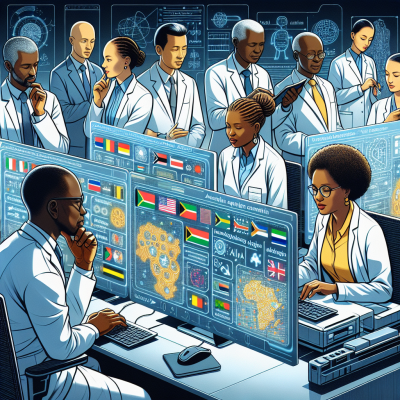
Empowering Africa’s Digital Future with African Next Voices
A monumental achievement in African artificial intelligence development has emerged through a coalition of dedicated researchers. Known as African Next Voices, this AI-ready dataset promises to revolutionize how the continent engages with technology by integrating African languages into digital ecosystems. This project not only helps close the language gap in machine learning but also promotes digital inclusion across diverse, multilingual populations.
Why Language Matters in AI Development
Language is the gateway to information, communication, and services in the digital age. However, global AI models have long excluded indigenous African languages, resulting in a digital divide that marginalizes millions of speakers. Traditional datasets are biased toward English, Mandarin, and a few other dominant languages, making it difficult for AI models to understand or respond appropriately in African linguistic contexts.
This exclusion isn’t merely an inconvenience — it’s a barrier to education, business, healthcare, and governance. The need to create localized, unbiased AI tools has fueled a new wave of innovation on the continent, spearheaded by initiatives like African Next Voices.
The Vision Behind African Next Voices
Developed by a consortium of African academics, engineers, and linguists, African Next Voices aims to integrate underrepresented languages into the digital mainstream. The dataset includes millions of data points across numerous African tongues, specifically curated for compatibility with machine learning applications.
It stands as the largest labeled dataset of African languages, making it a pivotal resource for training natural language processing (NLP) models. This means more accurate speech recognition, translation, and sentiment analysis in languages such as:
- Zulu
- Swahili
- Yoruba
- Hausa
- Amharic
- Twi
- Tswana
How the Dataset Was Built
Creating such a comprehensive library of languages was no small feat. The African Next Voices team collaborated with local communities, educators, media institutions, and civil society organizations to collect spoken and written language samples. These samples include:
- News reports
- Folklore and oral histories
- Social media content
- Local literature and publications
The data underwent a rigorous process of annotation and validation to ensure high precision and cultural sensitivity. By involving native speakers at every stage, the team not only ensured linguistic accuracy but also upheld ethical standards in data collection.
Open Access and Community Engagement
A defining feature of African Next Voices is its open-access licensing model. Unlike many proprietary datasets, this one is freely available to researchers, developers, and institutions. This model encourages community-driven innovation and lowers the barrier to entry for smaller African-based startups that previously couldn’t afford quality language resources.
Driving Digital Inclusion in Underserved Populations
Digital inclusion isn’t just about access to the internet; it’s about understanding and being understood online. By enabling AI systems to communicate in local languages, the dataset empowers people who have traditionally been left behind by the digital revolution. This includes:
- Rural communities receiving health or weather updates via local-language SMS bots
- Students learning in their native language using AI-powered education tools
- Governments offering services in multiple local dialects
- Entrepreneurs reaching customers through regional-language e-commerce platforms
Such integration fosters a deeper sense of belonging and cultural affirmation, vital for sustainable digital growth.
A New Chapter for AI in Africa
African Next Voices also has international implications. As more global tech companies look to expand into African markets, the availability of these AI-ready language resources enables a smoother and more ethical integration. More importantly, it allows Africans to lead the creation of solutions tailored to their own linguistic and cultural realities — a departure from the top-down, one-size-fits-all approach common in global tech.
What’s Next for the Initiative?
The project paves the way for future collaborations not only within Africa but across the Global South. Plans are already underway to expand the dataset, increase participation among underrepresented groups, and partner with both public and private sectors to build multilingual AI applications.
By opening the doors of the AI revolution to all Africans — regardless of geographic or linguistic background — African Next Voices affirms the continent’s rightful place at the forefront of digital innovation.
Conclusion
African Next Voices marks a transformative step towards linguistic equity and digital empowerment. By creating a massive, culturally rich AI dataset for African languages, researchers are redefining the role of local knowledge in global technological development. This historic project doesn’t just close the language gap — it opens up infinite possibilities for inclusive growth, innovation, and resilience in Africa’s digital era.


Leave a Reply